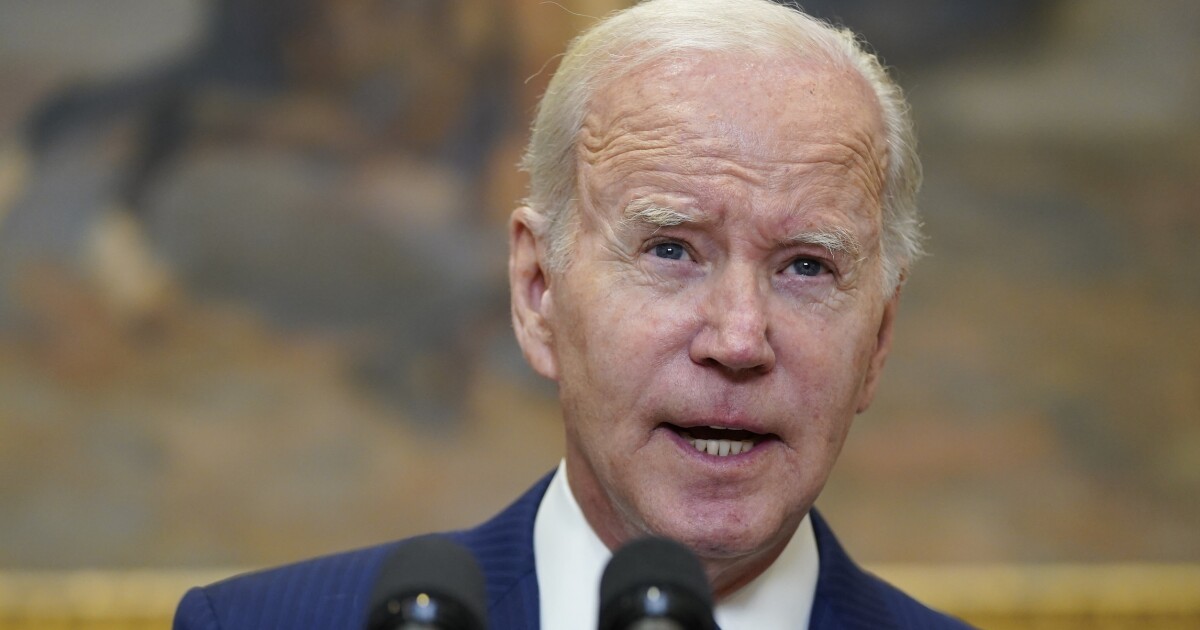

Even as he reassures the public that there won’t be a national default, President Joe Biden still faces big headaches over the debt ceiling.
House Republicans are proposing new work requirements for social benefit programs, nixing the president’s massive student debt transfer, and eliminating green energy-related tax credits in order to raise the debt limit, all of which cut sharply against Democratic priorities.
WHAT THE GOP WORK REQUIREMENT PROPOSAL WOULD REALLY DO
“To be clear, this negotiation is about the outlines of what the budget will look like, not about whether or not we’re going to in fact pay our debts,” Biden said Wednesday after meeting with congressional leadership. “The leaders have all agreed we will not default. Every leader has said that.”
That doesn’t mean things will be easy going forward.
The only debt ceiling legislation to pass a chamber of Congress is the Limit, Save, Grow Act, which would reduce spending by $4.8 trillion while increasing the debt limit by about $1.5 trillion. The White House has gone all-out opposing the bill, which it has dubbed the “Default on America Act,” yet some of its biggest proposals remain in discussion.
According to the nonpartisan Committee for a Responsible Federal Budget, strengthening work requirements for federal assistance programs would save $120 billion, scrapping student loan forgiveness and the income-driven repayment overhaul would save $460 billion, and eliminating green energy tax credits from the Inflation Reduction Act would save $570 billion.
“It’s not a revenue problem, it’s a spending problem,” House Speaker Kevin McCarthy (R-CA) said at his own Wednesday news conference. “The difficult part here is the timeline.”
On the work requirement idea, McCarthy added, “Why wouldn’t [Biden] want to help people out of poverty?”
The president had different ideas, saying he wouldn’t accept any new work requirements beyond those already in place and that, “for Medicaid, it’s a different story.”
The Republican National Committee is pushing the issue hard, highlighting an Axios poll that found 63% of respondents support work requirements along with previous Biden comments supporting the idea.
“Americans say that’s common sense,” RNC spokesman Tommy Pigott said. “Biden used to agree.”
Student loan forgiveness is a bigger budget item and one that conservatives have targeted from the day the forgiveness plan was announced last August. The Supreme Court will rule on the plan next month and could strike the plan down.
But canceling student loans was a Biden campaign promise and one Democrats used to outperform expectations in the midterms, meaning that reversing course could be tremendously damaging if the White House was seen as doing so voluntarily.
Vice President Kamala Harris, acting as a stand-in for Biden during his trip to Japan, largely did not address these specifics during a Thursday Zoom briefing. Instead, she focused on the administration’s longstanding messages about avoiding default.
“Make sure members of Congress know a default would not be acceptable under any circumstances,” she said in a virtual conference marred by technical difficulties. “Talk with your friends, your neighbors, your colleagues, and make sure they understand the real consequences a default would have on their lives, immediate consequences, and do what you all on this call, in particular, do best.”
Harris did not take questions afterward, though her boss has promised to hold a press conference on Sunday.
The final issue, tax credits for climate change-related policies, could save the largest amount of money, yet would be politically perilous for Biden. The president is underscoring his green agenda as he seeks another four years in the White House, making the tax credits another issue he can’t afford to cave on.
Biden’s nascent campaign team has called the Inflation Reduction Act “the most significant climate legislation in the history of our country.” Choosing this or any other progressive priority to jettison amid debt ceiling talks is going to be a tremendous challenge for the White House, especially with less than two weeks to go before the soft deadline of June 1.
CLICK HERE TO READ MORE FROM THE WASHINGTON EXAMINER
Nonetheless, Democratic strategist Tom Cochran is confident that a deal will be reached one way or the other.
“The Biden administration has done a good job with their public messaging,” said Cochran, a partner at 720 Strategies. “That said, the vast majority of Americans are likely not paying attention to this, at least not in detail. It seems that McCarthy and Biden are on the same page that the country cannot default on its debt, so I’m confident that a compromise will be reached.”





